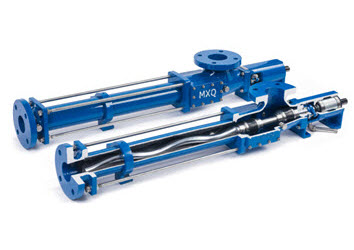Progressive cavity pumps are one of the important types of positive displacement pumps used across various industries for transferring different types of solids, as well as air-entrained and multiphase liquids. These pumps are specially designed for applications that may involve abrasive and corrosive fluids. Owing to their several beneficial features, these pumps find applications in several industries such as food and oil, adhesives, paper, and paint. The demand for these pumps have increased over the years. Nowadays, they are perceived as suitable alternatives for centrifugal pumps, and are available in different specifications. The pumps feature a rigid or flexible stator made of elastomer material, and a helical rotor, which help pump liquids at extremely high pressures. Although these features remain common to all pumps, their specifications may differ for each brand. It is important to consider a few factors while selecting the progressive cavity pump for your application, because a wrong selection may bring heavy losses. This post discusses several important factors that will aid you in a proper pump selection.
Easy-to-Follow Steps to Select the Progressive Cavity Pumps for Your Application
The following considerations will ease the selection of your progressive cavity pumps.
- Pumping Media: As with any other industrial pump, it is important to consider the properties to the pumping media during the selection. The following factors will make the selection easy for you:
- Solid-to-Liquid Ratio: This is basically the ratio of solid to liquid contained in a fluid. The presence of solids will influence the overall nature of the slurry.
- Nature of Solids in Suspension: At times, the pumping fluids may contain solids that are inconsistent or larger in size and shape. They may be round, hard or soft, dense, light, pulpy or non-pulpy, fibrous, and so on. Thus, it is important to assure that the chosen pump has sufficient cavity size that allows solid constituents of various sizes to pass.
- Nature of the Liquid: The liquid to be transferred may be viscous or non-viscous, corrosive or abrasive in nature. So, ensure that the pump is suited to carry abrasive liquids.
- Temperature: It refers to the minimum and maximum temperatures of the fluid to be pumped. Now, along with this consideration it is important to know the maximum temperature range of the stator material. If a wrong material is chosen, then there is a chance that the stator may swell and distort at high temperatures, thereby affecting the performance of the pump. Also, if your fluid is being pumped at extremely low temperatures, this may affect its viscosity, which again influences the horsepower requirements as well as flow characteristics of the pump.
- Pressure: The pressure required to move the liquid through the piping system, and the type of the fluid to be handled must be considered. In addition to this, it is also important to consider the differential pressure. The differential pressure is the difference between the pressure introduced to the pump suction and the pressure at the pump discharge. This measure is often expressed in Pounds per Square Inch (PSI). There is a high chance of a pump slip at increased pressures. Also, additional rotor or stator stages are required at high pressures. The rate of abrasive wear increases at high differential pressures.
- Viscosity: There are many factors that may affect the temperature of the fluid, and viscosity is one of the prime factors. The viscosity is expressed in various units across processes.
There are a few more important considerations to be made during the selection of progressive cavity pumps.
Progressive cavity pumps are nowadays becoming a popular choice in various industries that handle different types of fluids, including solid and liquid. The selection of these pumps becomes important owing to the key role they play in the process industry.
Important Factors to Be Considered While Selecting Progressive Cavity Pumps
As with any other industrial pumps, there are several factors that need to be carefully analyzed while choosing the progressive cavity pumps for your facility. Sometimes it may not be possible to conduct an in-depth analysis of these factors, nevertheless the following considerations will still help ease your selection process.
- Abrasion: This is one of the major reasons of pump failure. Wear characteristics of the pump depends on the abrasive nature of the solid constituents in the fluid. The abrasives are classified into the following types, and their understanding will help you select the right pump construction material.
-
- No Abrasives: Fluids such as clear water, fuel oil, gasoline, and lubricating oil belong to this category.
- Light Abrasives: Fluids such as dirty water containing sand, soil, or silt are considered light abrasives.
- Medium Abrasives: The fluids including potters glazes, clay slurries, porcelain enamel, wood dust, frit, and sludge are included in this category.
- Heavy Abrasives: Slurries that are loaded with emery dust, sand, mill scale, lapping compounds, roof gypsum, and grout are termed as heavy abrasives.
-
- Environmental and Installation Considerations: As progressive cavity pumps are suited for a wide range of process applications, it is important to consider them in a wide perspective. The applications may involve several variables, such as portable or fixed, reversible flow, semi-submersible, hazardous or harsh environment, customized drives, etc. Sometimes the products may have special sealing requirements, or the pump may be used in a dry-run condition or overpressure.
With due consideration of all the factors, you can easily configure a progressive cavity pump that meets your application requirements. Along with these considerations, it is also important to source the pump from a reliable supplier such as MXQ. The company provides various types of progressive cavity pumps including Bornemann Equivalent Pumps, Netzsch Equivalent Pumps, and Moyno Equivalent Pumps.


